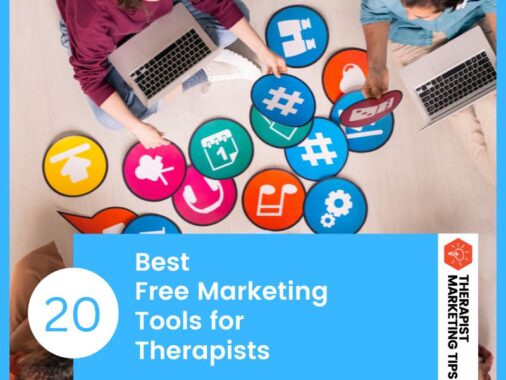Taking a deep dive into the 10 most essential marketing statistics therapists can use to maximize their return on investment in marketing.
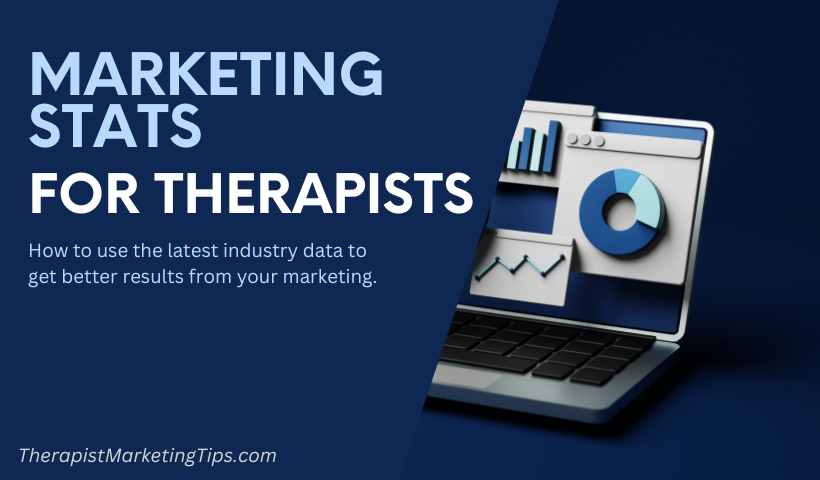
If you’re anything like me, simply thinking about how to market your private practice can be an overwhelming experience.
There are websites, Search Engine Optimization, local SEO, and something called schema markup.
There’s Facebook, TikTok, blogs, and content and whatever the heck this Threads thing is, and…
I’m getting stressed out just writing all that.
So, if you’re trying to figure out which one of those aspects of marketing (not to mention the countless others) you should focus on in 2024, I can see why you’d be stressed out too.
How Marketing Stats Can Help Therapists
Here’s the good news:
Every year, the marketing industry spews out scores of updated statistics on things like:
- Which platforms produce the best Return on Investment (ROI)
- Which type of marketing content resonates best with audiences
- Which marketing strategies are best for increasing web traffic and conversions?
By studying these statistics, we can learn valuable lessons about which aspects of marketing will be most effective in helping us grow our private practice.
The bad news, however, is two-fold:
- There are hundreds of marketing stats. Reading through all of them takes a ridiculous amount of time.
- It’s not always obvious how general marketing data applies to our specific industry.
fortunately for you, I’ve done all the hard work for you.
I’ve poured through an endless number of 2024 marketing statistics to find the 10 I think are the most relevant to therapists.
In this guide, you’ll find a deep dive into each of those stats, along with my recommendations on how you can use the data to get better results from your marketing efforts.
10 Essential Marketing Statistics Therapists Need to Know in 2024
1. 91% of Businesses Used Video as a Marketing Tool in 2023
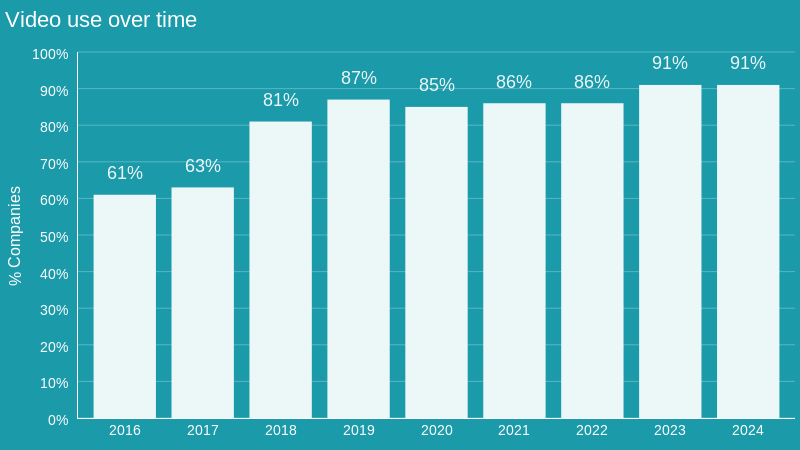
Source: Wyzowl
What’s more, of those who weren’t using video, 61% said they planned to do so in 2024.
Why is this such a big deal?
Well, it’s partly because many of the most popular marketing platforms – Instagram, TikTok, and YouTube- are primarily video-based platforms.
According to DemandSage, video content is on course to account for 82.5% of all web traffic, with 3.1 billion Internet users consuming online videos every day.
In other words, if you really want to reach your audience and get more therapy clients, you’ll inevitably need to use video content.
And why wouldn’t you when a video is one of the best ways to demonstrate your expertise, showcase your personality, and begin building rapport with your clients long before they ever step foot in your therapy room?
What This Means for Your Practice:
Of all the marketing statistics therapists should be paying attention to this year, the wealth of data pointing to the importance and necessity of video content is one you simply can not afford to ignore.
If you don’t want to create your own YouTube channel like the incomparable Kati Morton, you should at least be thinking about how you can use tools like Canva to create short, educational clips for platforms like TikTok, Instagram, and YouTube Shorts.
I’ll be posting a lot more about video content in the coming year. If you haven’t already, follow Therapist Marketing Tips on Facebook to ensure you don’t miss those posts.
2. 90% of Video Marketers Rate YouTube As the Top Video Platform
While platforms like TikTok remain popular with younger audiences, 90% of video marketers still prefer YouTube.
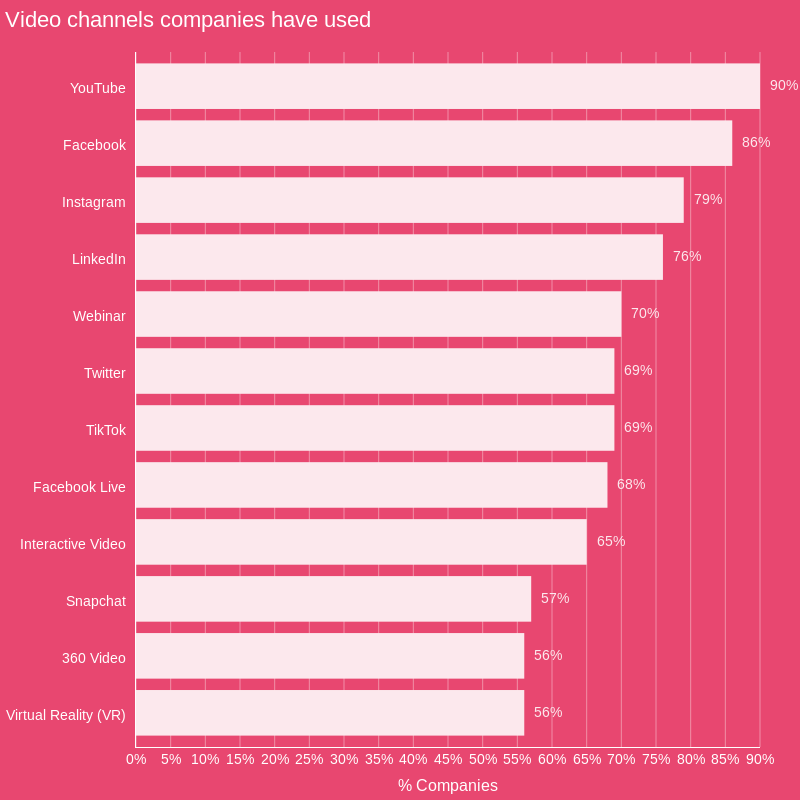
Source: Wyzowl
Other popular platforms include:
- Facebook (preferred by 86% of video marketers)
- Instagram (79%)
- Linkedin (76%).
What This Means for Your Practice:
If you’re figuring out how to incorporate video into your therapy practice marketing plan, exploring ways to use these four top platforms is a good place to start.
3. 96.5% of Internet Users Access the Web via Mobile “At Least Some of the Time”
This is according to Datareportal, who also notes that 67.6% of our online time is spent on mobile devices.
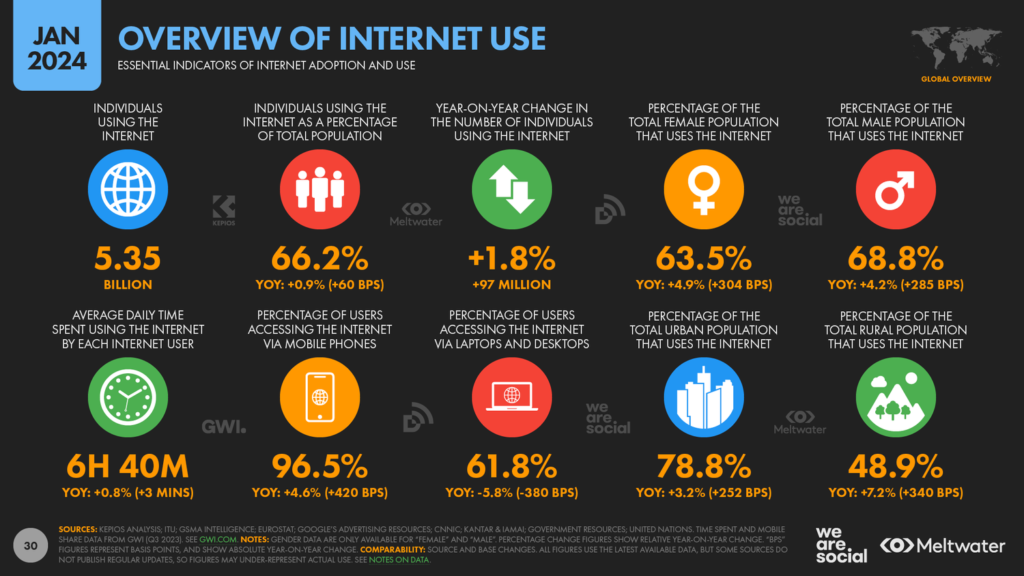
Source: Datareportal
By now, this should be fairly obvious, but it’s worth repeating that everything you do to promote your therapy practice needs to be accessible to mobile users.
If it isn’t, then you’re failing to meet your potential clients where they are and losing out on valuable opportunities to grow your practice.
What This Means for Your Practice:
Audit your online presence to ensure everything looks good and functions flawlessly on mobile devices.
This doesn’t just mean ensuring your website adjusts to any screen size for seamless viewing on all devices.
It also means you should be making your phone number clickable on your website.
That way, when a potential client lands on your site, they can easily tap to call you and schedule an appointment, removing friction from the initial contact and increasing the chances they’ll connect with you.
It means upping your social media game to get your practice into your audience’s algorithms when they reach for their favorite social media app.
It may even mean offering a simple, mobile-friendly platform for potential clients to schedule appointments directly.
4. 29% of Marketers Say Facebook Generates the Highest ROI
As a private practice therapist with limited time and resources, you simply can’t afford to take “throw everything against the wall and see what sticks” approach to your marketing.
You need to invest your efforts in those platforms and strategies that are going to produce the best possible return on your investment.
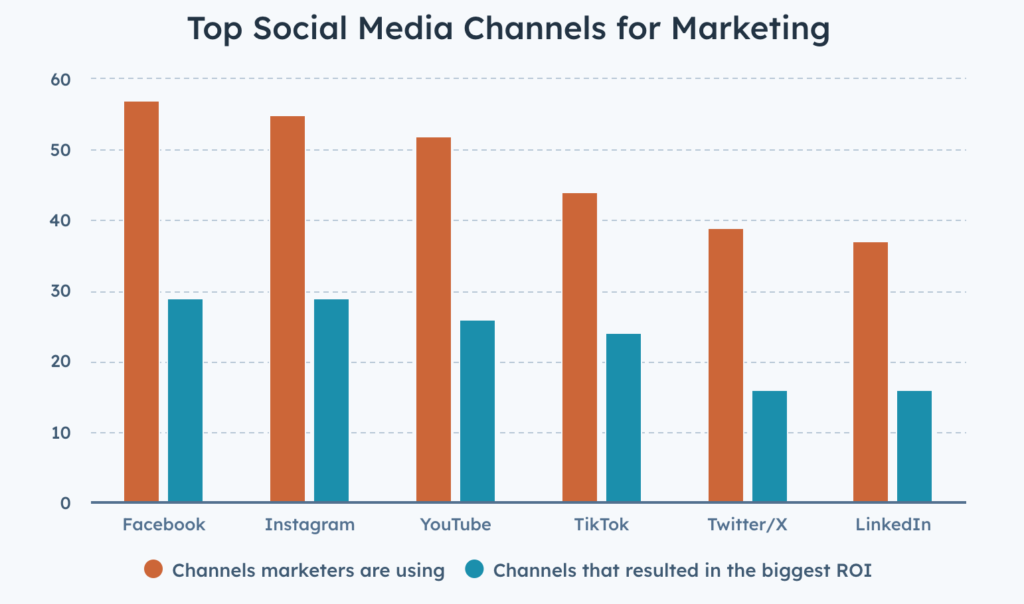
Source: Hubspot State of Marketing Report 2024
When it comes to social media, 29% of professional marketers point to Facebook as the platform that generates the highest ROI (Return on Investment).
A further 29% say they get the best results from Instagram, followed by YouTube at 26%.
What This Means for Your Practice:
If your goal is to attract more counselling clients and grow your private practice in 2024, it’s time to start to thinking about how you can use Facebook and Instagram more effectively.
My guide to making mental health posts for Instagram can certainly help with this.
This statistic also provides further evidence that starting a YouTube channel could prove to be one of the best marketing moves you can make this year.
5. Personalized Mobile Messaging Drives 120x ROI
Personalization is one of the biggest buzzwords in marketing right now. Every brand, business, and service provider around is experimenting with ways to deliver personal online experiences.
Why?
Because it works.

Source: Hubspot State of Marketing Report 2024
94% of marketers insist that personalization drives more sales while incorporating personalization into mobile messaging is said to generate returns of up to 120x the investment.
What This Means for Your Practice:
As therapists, making personal connections with our clients is essential for our success.
So there’s a lot to be said for using tools that help us deliver more personal experiences without eating away at our precious time and energy.
As a result, you can deliver more relevant and engaging information, improving client response rates and strengthening relationships.
If you’re already using tools like Facebook Messenger and WhatsApp to manage your client communications, it’s worth exploring how their business tools can help you create these all-important personalized interactions.
Mobile messaging personalization uses the power of automation to tailor message content and timing to individual clients based on their preferences, demographics, and past interactions.
This could be in the form of automated appointment reminders, personalized “tip of the day” messages, or targeted therapy resources.
6. Organic Search is Responsible for 53.3% of Web Traffic
Even at a time when we have more ways to market our practice than ever before, a therapy practice website remains an invaluable tool.
It’s here where you can demonstrate your experience and experience, convert potential clients into paying clients, and grow your personal brand, all from one platform.
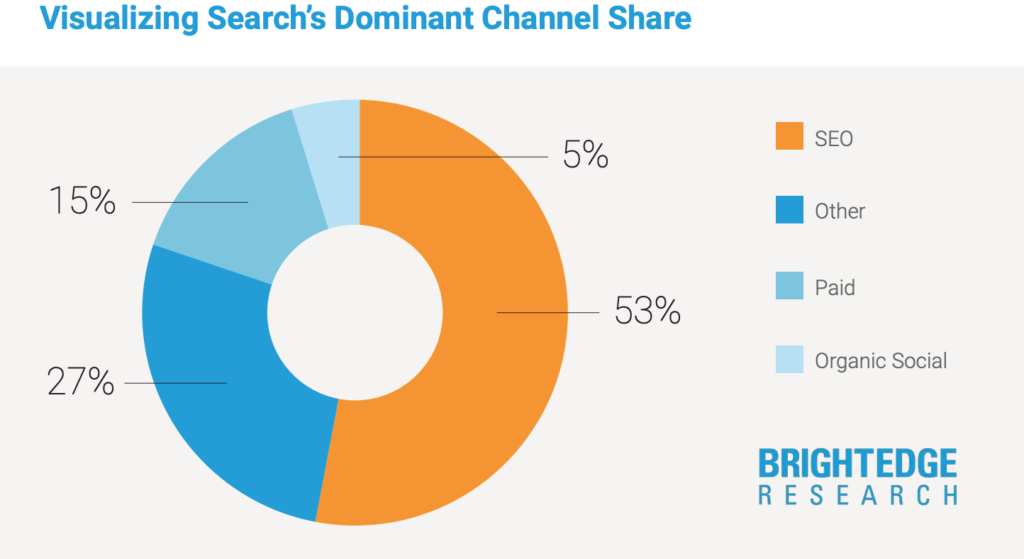
Source: Brightedge Research
Of course, all those outcomes depend on you driving traffic (visitors) to your site in the first place.
With 53.3% of trackable web traffic coming from organic search results, an investment in Search Engine Optimization (SEO) to drive organic traffic remains an indispensable strategy for any private practice therapist.
What This Means for Your Practice
SEO can be daunting for therapists who consider themselves “not very technical,” but here’s the thing:
It’s one of the easiest ways to grow your practice and one of the most affordable.
I recommend learning how to understand the user intent behind your audience’s search queries and crafting a high-quality online experience that matches that intent.
Reading my guide to creating helpful content that Google loves will help you turn your website into a valuable resource for those seeking mental health support which, in turn, will help boost your visibility in search results, drive more traffic, and land more clients.
7. 62% of Marketers Say AI is Important to Their Marketing Strategy
AI (Artificial Intelligence) tools like ChatGPT and Google’s Gemini aren’t going away any time soon. In fact, they will only play an increasingly bigger role in how we create and consume online content.
From a marketing perspective, 64% of professionals say they use AI and automation in their work, 62% say it’s important, and 95% of those who use it are more likely to say that their marketing strategy was “very effective.”
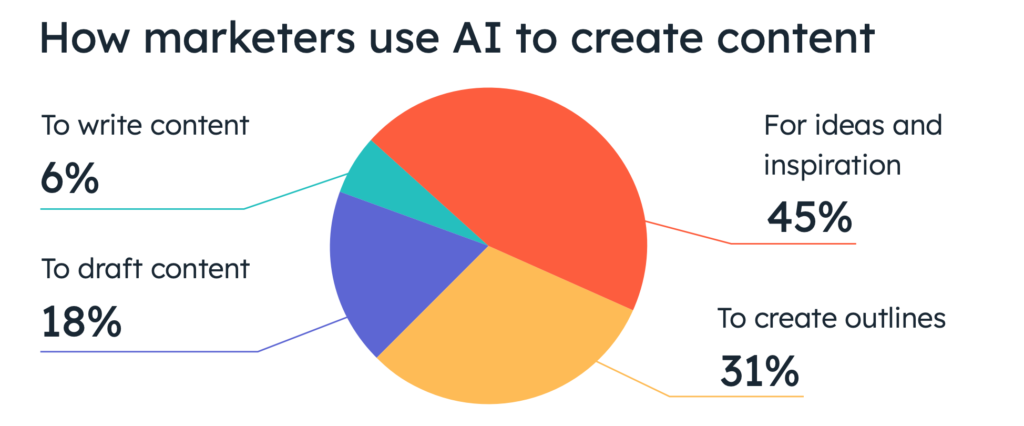
Source: Hubspot State of Marketing Report 2024
I’ve already talked about the various ways to use ChatGPT as a therapist, but if we’re talking purely about marketing, it appears most marketers use it as a research and idea-generation tool.
45% of marketers use AI to come up with new content ideas, while 33% say research is where AI use proves more successful.
What This Means for Your Practice
Few technologies have divided people quite like Artificial Intelligence.
Some see it as the downfall of civilization and view anyone who even considers using it to be a cheater and a fraud.
Others accept that AI isn’t going anywhere and they may as well experiment with ways they can use it to their advantage while still creating accurate, ethical, and useful content for their audience.
If you’re wondering which side I’m on, let me just say that I used Google Gemini to help me fact-check this guide and get unstuck when I needed a little help fine-tuning the occasional sentence.
That’s where I think AI’s strengths really lie.
I wouldn’t recommend opening ChatGPT, telling it to write you an article about how to deal with stress and posting it verbatim on your website.
It’s not going to be very good.

However, you can certainly use tools like Gemini’s “double-check responses” feature to find credible sources for your work.
If you’re struggling to come up with new ideas for blog posts or videos, I’d also recommend using such tools to help you get over your creative block and generate new topics that you can then work on unassisted.
8. 37% of Social Media Users Prefer Engagement Over Content
Here are some marketing statistics therapists with limited time will no doubt find exciting:
37% of social media users prefer brands who engage directly with their audience over those who simply post a ton of content.
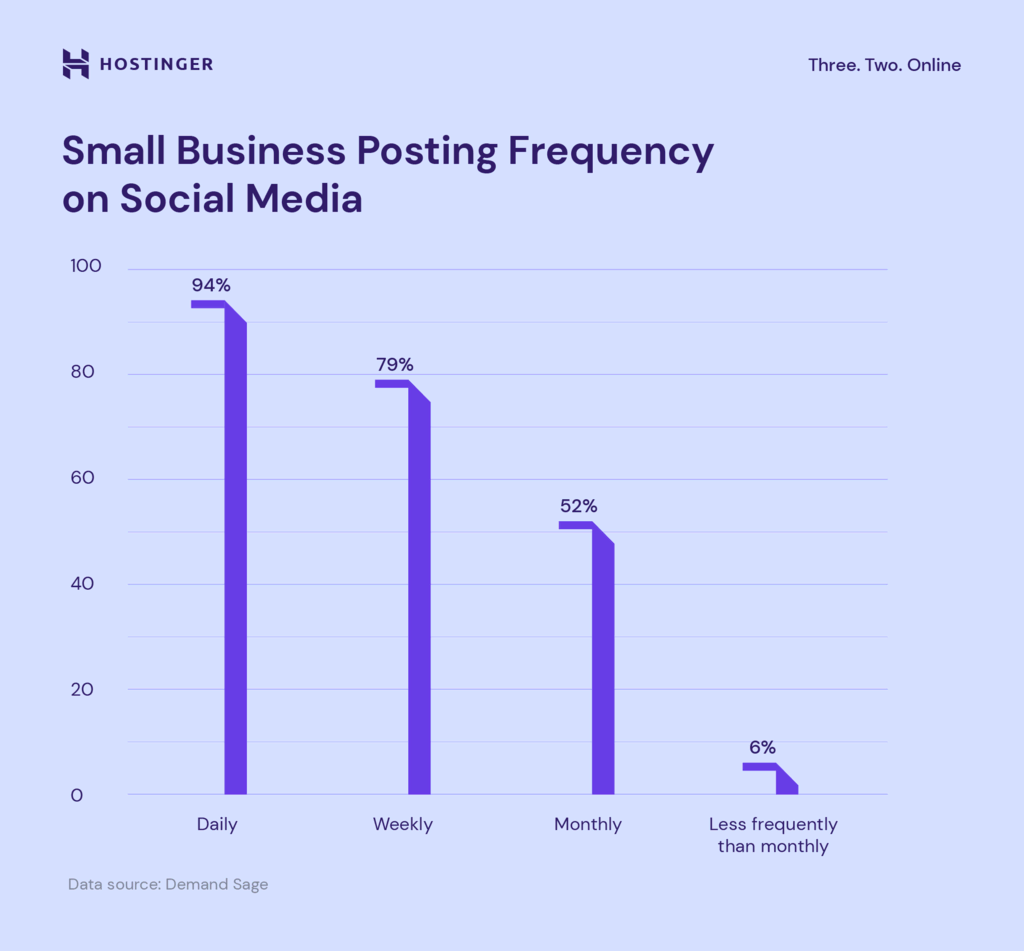
Source: Hostinger / DemandSage
I found this statistic hidden away in this chart which shows that 52% of small businesses post to social media on a monthly basis and thought it was incredibly important.
After all, if you’re busy running your practice, chances are you don’t have hours to spend creating an endless amount of engaging social media posts.
Still, if you can take five minutes or so per day to engage with your existing audience, then you’re still going to reap rewards from social media marketing as a therapist because engagement matters – you’re building personal connections, you’re building trust, you’re building relationships that will give you a clear head start in the therapy room.
What This Means for Your Therapy Practice:
In a sea of content, engagement sets you apart. People are drawn to authentic interactions, and your willingness to connect with them shows you truly care about their needs and well-being. This differentiates you from therapists who rely solely on static content.
Every like, comment, and answer you give is a step towards building trust and establishing a genuine connection with potential clients. They see you as approachable, engaged, and actively listening.
This humanizes your practice and makes it easier for them to imagine themselves working with you.
9. Organizations With a Content Strategy Achieved 27.1% Higher ‘Win rates’
Here’s a statistic that shouldn’t be too surprising:
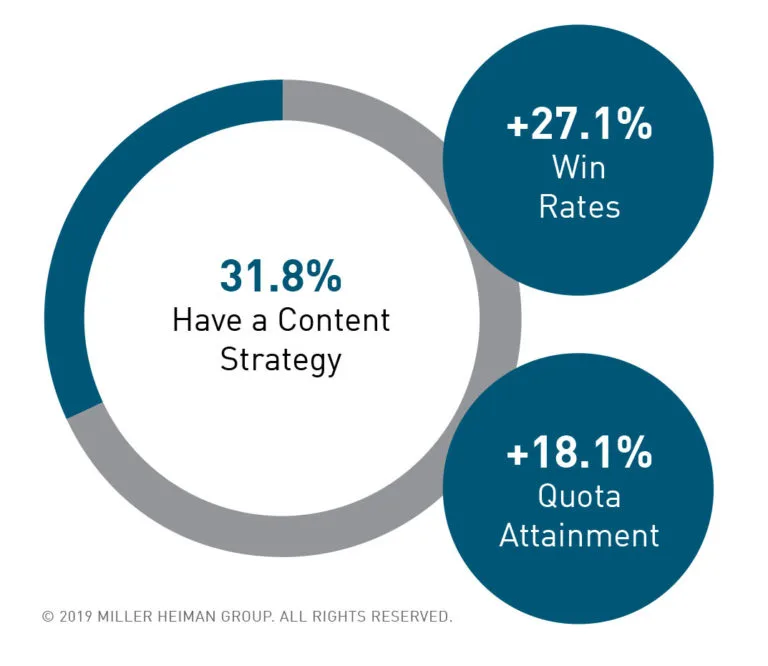
Source: Sales Enablement Pro
Having a dedicated, focused strategy for your online content can produce over 27% better results than randomly throwing out content with no clear goal or direction.
Look, I get it:
Taking the time to craft a strategy for your marketing efforts takes time and effort, but the payoff is undeniable.
Can you really afford to miss out on bringing in nearly a third more clients?
What This Means For Your Therapy Practice:
If you’re not already taking a strategic approach to content marketing, doing so now could prove to be the one game-changer you’ve been missing.
For one thing, it helps you avoid that panicked feeling you get when you know you should be posting something but can’t figure out what it should be or where you should post it.
It provides you with a blueprint that will ultimately save you time in the long run as it means you’re never short of ideas.
It’s a map that guides your content marketing efforts, keeping them fully aligned with the goals of your practice.
Going forward, take the time to draft a strategy thinking about:
- Who is your audience?
- What do they need from you?
- Where do they hang out online? How can you meet them where they are?
- What types of content resonate best with them?
- What are the key messages you need to get across?
10. Businesses Using Data-Driven Marketing Produce 5 – 8 times More ROI Than Those Who Don’t
As therapists, we’re limited on what data we can collect about our clients and how we can use it.
That’s just as it should be, and I’m not for a second suggesting that we use client data in ways we’re not supposed to.
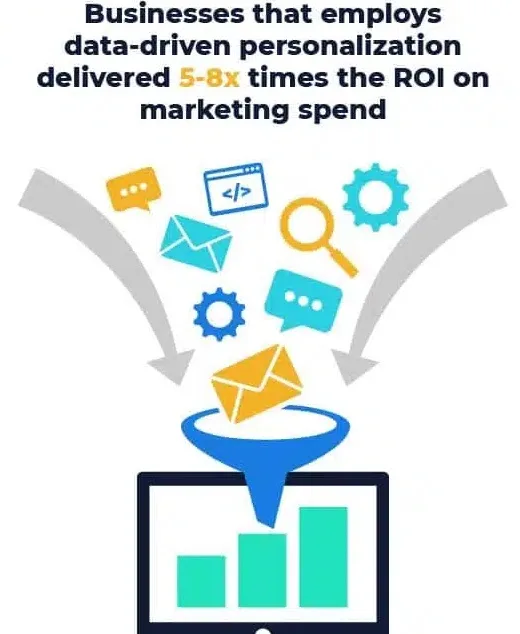
Source: Invesp
But here’s the thing:
Even with GDPR and HIPAA in place, we can still use data to help us improve our marketing efforts, and why wouldn’t we when businesses using data-driven strategies see 5-8X ROI compared to those flying blind?
Tools like Google Analytics, Search Console, and the in-built analytics tools offered by most social media platforms offer valuable insights without compromising client privacy.
What This Means for Your Therapy Practice:
If you’re not already tracking which blogs, social media posts, and videos are getting the most views and engagement, you have no clear way of knowing what’s working and what isn’t.
Connect your website to Google Analytics and Google Search Console to assess performance.
Use Meta Business Suite to look at your top-performing content and measure ROI.
Ultimately, doing so will help you to cut out any approach that isn’t producing results and invest more in those that are contributing the most to the growth of your practice.
Marketing Statistics Therapists Need to Know: Key Takeaways
I’ve thrown a lot of data at you in this analysis of key marketing statistics for therapists, but if you’ve been paying attention, you should have spotted a few key themes:
- Therapists can’t afford to ignore video – 3.1 billion Internet users watch online videos every single day, with 90% of marketers telling us YouTube is the best platform to post those videos.
If you’re not making video content to showcase your expertise and personality, you’re going to be left in the dust.
- Facebook is still the best social media channel for marketing – Meta’s flagship platform is the highest driver of ROI for 29% of marketing professionals and ranked second in the best video content platforms, preferred by 86% of marketers.
Wondering where to focus your social media marketing efforts in 2024? These stats point to Facebook as the platform that’s best worth your time and energy.
- AI is here to stay whether we like it or not – From creating automated personalized messaging to assisting with the content creation process, Artificial Intelligence will play an increasingly bigger role in marketing throughout this year.
While some of you may be ardent about avoiding AI altogether, a more effective approach is to experiment with ways you can use AI ethically and legitimately to help you grow your private practice.
Enjoyed this post? Get more marketing advice for therapists every week by following Therapist Marketing Tips on Facebook.
SOURCES:
- WyzOwl
- DemandSage
- Datareportal
- Hubspot
- Brightedge Research
- Google Gemini
- Hostinger
- Sales Enablement Pro
- Invesp





